Lea Wait's Blog, page 33
August 8, 2024
Ahh, sometimes the life of a writer can be sweet… or three chicks on a ferry
Jule Selbo
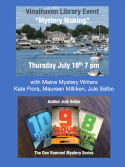
Want to know what it’s like to feel appreciated, respected and an immediate part of a community as a writer?
Join the three chicks on a ferry who were invited to visit Vinalhaven Island Library to lead a night of fun: Create A Mystery Night.
Kate Flora got the enquiry. Turns out Jen Wadleigh (head librarian and author), librarian Linda Whittington, Board Members and a super-active group called Friends of the Library asked if a special night could be put together for their summer programming. The library wanted to make sure that it was understood that ferry tickets, a cocktail party, publicity for the event and a water-view cottage with a refrigerator full of snacks, quiche, salad, wine and seltzers would be provided.

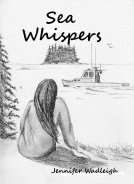

—— Jennifer Wadleigh/librarian/author/ lobsterwoman and FOL —–
As the emails passed back and forth, Jen assured us (Kate, Maureen Milliken and me) the islanders were voracious readers, they loved to get together to talk about books and writing and that the timing of the event would not conflict with the island’s busy summer concert schedule, its poetry sessions, its ice cream socials and parades. Jen told us to bring lots of books, because islanders liked buying author-signed books.
The day arrived, Kate, Maureen and I meet at the ferry in Rockland at noon and for the next 24 hours – lived a pretty idyllic life. I’ve been a life-long lover of all things Maine but I’ve only been a full-term resident here for less than a decade and so Vinalhaven Island was still on my ‘go-there’ list.
The Penobscot Bay island (permanent population about 1200) is part of the Fox Islands (named after silver foxes who lived there) along with the smaller nearby island North Haven (permanent population about 350). Around 5000 years ago, it was the home of the Red Paint People and then the Abenaki made homes there. When Europeans found its shores in the 16th century, they saw its full forests and granite resources, sawmills and quarries were set up.
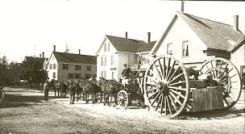
The granite even made its way to New York, it was used in the construction of St. John the Divine and the Brooklyn Bridge. More European settlers arrived, and farms were built and the island was thriving. During the Revolutionary War, the Brits looted it and terrorized the (mostly) Patriot community.
After the war, near the end of the 1700s, the islanders petitioned The General Court of Massachusetts that the settlers of the island be given full possession of the lots they occupied. Massachusetts agreed if a place of public worship was built, a minister hired, and a school raised for the children. Deal done. At that point, it was named after John Vinal, a Boston lawyer who (he must have done) a super-duper job on doing all the paperwork.

It’s a laid-back place. There are a lot of sailboats, but I didn’t see any large marina. There are art galleries and a few cafes and taverns and a few nice clothing stores, but the sidewalks near the ferry (and one of the best donut shops I have ever visited) are not crowded.

And the readers turned out! The library (built with support of Andrew Carnegie) was packed – every seat was taken in the main room, people were standing in hallways and every available cubby.
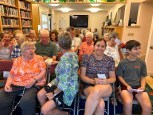 The night was a lot of laughs, included great creative ‘what-ifs’ (Darth Vader as one of our murder victims) fabulous audience participation, we included a raffle (we each contributed a book) and we sold nearly every book we’d brought over in our suitcases.
The night was a lot of laughs, included great creative ‘what-ifs’ (Darth Vader as one of our murder victims) fabulous audience participation, we included a raffle (we each contributed a book) and we sold nearly every book we’d brought over in our suitcases.
At the end of the event, we three chicks headed back to our own-for-the-night spacious cottage where more food and fine beverages were provided. We three stayed up talking about writing, love of stories and characters and all things that go along with being a crime/mystery writer. The moon shone on the water, a breeze was blowing through the curtains. This was another highlight of the trip.

In June, 2020, a black bear was spotted going ashore on Vinalhaven. Most people think he swam over from the mainland. I don’t know if he decided to stay or not. Well – we didn’t swim, we took a ferry – but I certainly could have stayed a long long time.
And as a sidelight, famous artist Robert Indiana lived on Vinalhaven. These are some of his most famous pieces and one he had no hand in at all – can you guess which one he would not take credit for?





August 5, 2024
Writing out of Space and Time
Rob Kelley here, writing this month’s entry on the road. I switched dates this month to accommodate another Maine Crime Writers’ travels and find myself writing this post while traveling. I was out in beautiful Albuquerque visiting with two of my sisters and got some great writing time in: first on the plane on the way out, then in the early mornings, still on Eastern Daylight Time.

View of Albuquerque from the Sandia Peak Tramway–That’s a long way down!
Margot and I call these “hotel days”: found time in a quiet, unfamiliar place that spurs creativity and focus. When one of us travels for work, the other often tags along, making it a bit more fun and building in a hotel day!
Writers get into the zone in different ways and I’ve tried to be conscious about what things have worked for me historically so that I can make those part of my ongoing practice.
Early in my career, before my responsibilities grew, I was often able to carve out time on Sundays to work for an hour or two, drafting several early attempts at novels. But as my career took off, I couldn’t find the down time to do that more engaged work, not in the mornings, evenings, or the weekends. My brain just couldn’t turn off my work creativity to make space for my writing creativity.
That said, I found small sparks, often while on the road. I traveled a significant number of weeks a year, and while flying would whip out a notebook to jot down a random idea, or while driving would sent myself a voicemail over speakerphone.
There’s a likely very anecdotal story about a Nobel Prize-winning author who had a huge hot water tank installed in his house so he could have extra shower time to think. True or not, I get it. I often find that a shower or a drive help me solve plot and character conundrums that thwart me completely when I’m just staring at the screen. “Shower thoughts” are a well-documented psychological state, a version of the state of flow that allows our “default mind network” to surface novel ideas and creativity. (It is also a delightfully quirky Reddit subreddit).
I find that those alternative spaces, and places, where I can let my mind wander are valuable enough that I now try to incorporate it more purposefully in my writing. When I hit a snag in a draft or revision–with some intractable plot hole or lack of believable character motivation–I consciously frame the problem in my mind then let it go. Reliably, after an hour or so, a day or two, in the shower, on a walk, or in the car, some version of the answer appears.
How do you inspire yourself to be creative or get past a writing conundrum?
August 4, 2024
The Giant & The Hummingbird
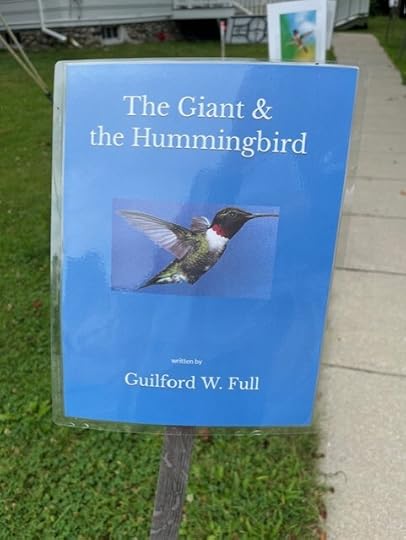 Writers take many approaches to telling a story.
Writers take many approaches to telling a story.
We use words and pictures. First and third person narrators. Single and multiple points of view. Fact and fiction. There are endless ways to spin a tale.
Recently I experienced (and truly, that’s the right word for it) a marvelous story that incorporates all of the above variations and—in an unusual twist—was published in the great outdoors.
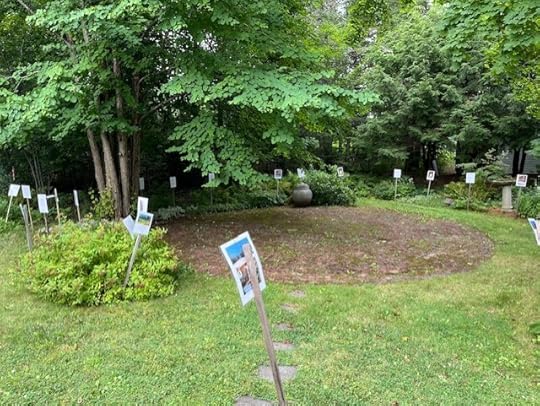
Called THE GIANT & THE HUMMINGBIRD, Guilford W. Full’s literary installation in the garden of Friend Memorial Library in Brooklin is a delight for children and adults alike.
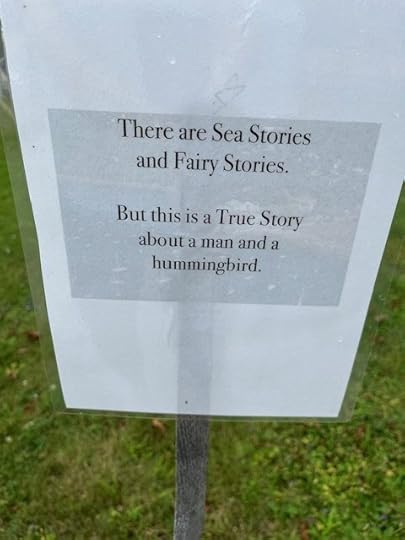
That’s how the story begins, the third person voice is that of a retired sailor who lives on a farm in an unnamed Downeast town that bears a striking similarly to Brooklin itself.
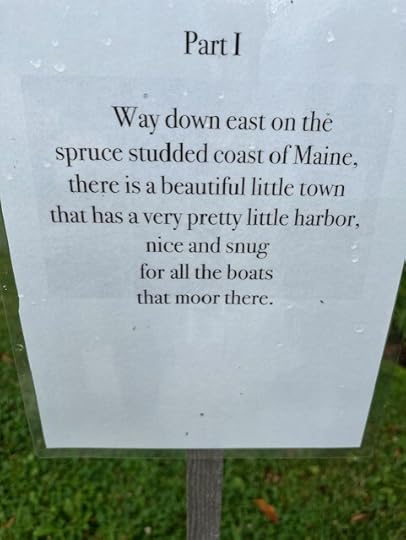
In weatherproof pages planted on the perimeter of the Circle of Friends Garden, the reader first reads how the hummingbird was found trapped inside the sailor’s barn.
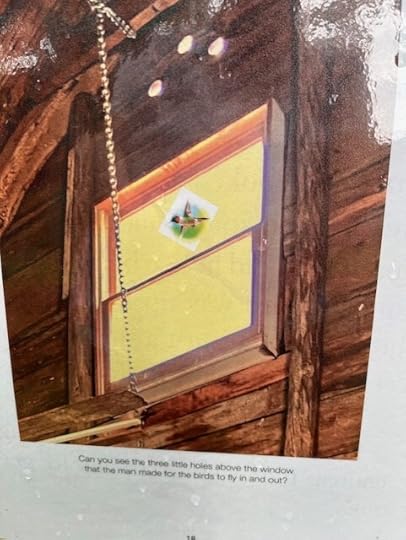
There is tension.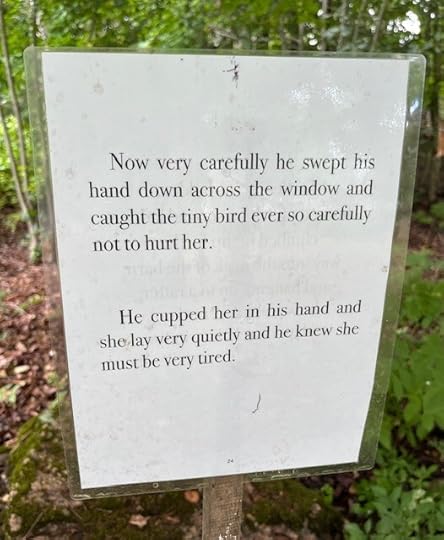
Then, halfway through the story, the tiny bird,writing in first person, tells the story from her point of view.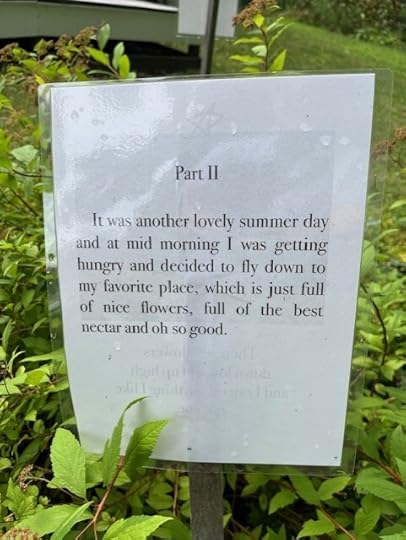
She turns out to be something of a drama queen, but being so small and vulnerable, she can be forgiven.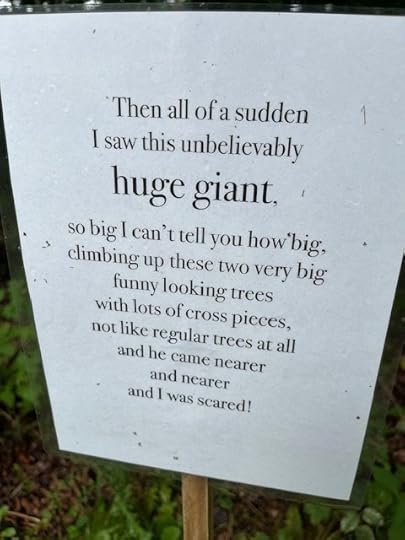 I don’t want to spoil the tale for those who might find their way to Brooklin this summer, but I assure you the ending is happy.
I don’t want to spoil the tale for those who might find their way to Brooklin this summer, but I assure you the ending is happy.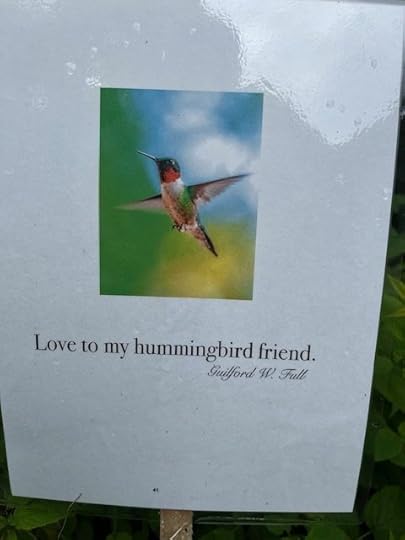
Kudos to Giffy Full for inspired storytelling, and to the folks at Friend Memorial, who are always open to creative ideas.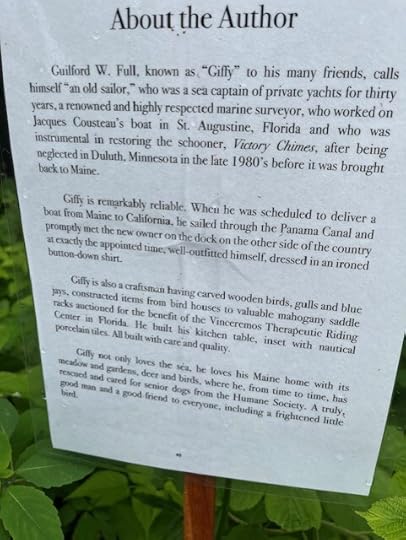
THE GIANT & THE HUMMINGBIRD is just one example of the commitment of Maine’s library community–professionals and volunteers–to engage with their communities on many levels in order to spread the joy of reading.
Whether you’re enjoying a staycation in your own town this summer or traveling around the state, make the local library one of your destinations. You never know what amazing discoveries you’ll make there.
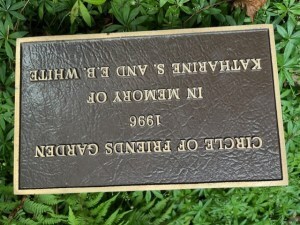
Brenda Buchanan sets her novels in and around Portland. Her three-book Joe Gale series features a contemporary newspaper reporter with old-school style who covers the courts and crime beat at the fictional Portland Daily Chronicle. An attorney since 1990, Brenda currently is writing a series about a criminal defense lawyer who takes on cases others won’t touch in the hometown to which she swore she’d never return. Brenda’s short story, “Means, Motive, and Opportunity,” was in the anthology Bloodroot: Best New England Crime Stories 2021 and received an honorable mention in Best American Mystery and Suspense 2022. Her story Assumptions Can Get You Killed appears in Wolfsbane: Best New England Crime Stories 2023.
August 2, 2024
Weekend Update: August 3-4, 2024
 Next week at Maine Crime Writers there will be posts by Brenda Buchanan (Monday), Rob Kelley (Tuesday), Jule Selbo (Thursday) and Joe Souza (Friday).
Next week at Maine Crime Writers there will be posts by Brenda Buchanan (Monday), Rob Kelley (Tuesday), Jule Selbo (Thursday) and Joe Souza (Friday).
In the news department, here’s what’s happening with some of us who blog regularly at Maine Crime Writers:
Hey! Massachusetts, Rhode Island and Connecticut fans! We know you’re out there… Maureen Milliken will be at the Pages & Pints Small Press Expo at Mayflower Brewing in Plymouth, Mass., 12-4 p.m. Sunday.
 The event celebrates local authors, small presses, and indie book shops. There are dozens of authors and other vendors represented (besides Maureen!), so come on over and check it out. It’s free, and it’s indoors. And, um, pints, people!
The event celebrates local authors, small presses, and indie book shops. There are dozens of authors and other vendors represented (besides Maureen!), so come on over and check it out. It’s free, and it’s indoors. And, um, pints, people!
Maureen will also join fellow Maine Crime Writer Kate Flora at their monthly table at the Brunswick Art Walk from 4-7 p.m. Friday, Aug. 9. They’re easy to find — they’ll be right next to fellow Maine Crime Writer and Brunswick local guy Matt Cost’s table. Come on down and say hi!
An invitation to readers of this blog: Do you have news relating to Maine, Crime, or Writing? We’d love to hear from you. Just comment below to share.
And a reminder: If your library, school, or organization is looking for a speaker, we are often available to talk about the writing process, research, where we get our ideas, and other mysteries of the business, along with the very popular “Making a Mystery” with audience participation, and “Casting Call: How We Staff Our Mysteries.” We also do programs on Zoom. Contact Kate Flora
Getting Inspiration from Writing Books or from Writers
Kate Flora: Through some fluke of scheduling, I am blogging this week on Monday and again on Friday. Regularly finding topics to blog about is always a challenge. Sometimes there’s something happening in the book I’m writing that lends itself to a post. Sometimes there’s something happening in a book I’m reading. Often, when neither of those arenas provides a subject, I look around or wander around the cottage, waiting for inspiration to strike.
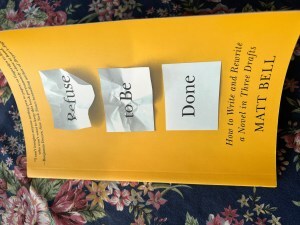 We’ve styled the Maine Crime Writers blog as all things writing and all things Maine, a lovely broad description which lends itself to all kinds of musings. As I wandered the cottage today, I found that there were many books about writing lying about in various stages of being read. On the windowsill beside the binoculars and the bird book was Refuse to Be Done, a book about editing. I’ve barely scratched the surface so far, but I look forward to Matt Bell’s advice on revision soon, when I finish the current WIP, the ninth Joe Burgess, Deliver Us from Evil. I’m 70K words into a book that will probably run around 85K, so the end, while still somewhat a mystery to me, is in sight.
We’ve styled the Maine Crime Writers blog as all things writing and all things Maine, a lovely broad description which lends itself to all kinds of musings. As I wandered the cottage today, I found that there were many books about writing lying about in various stages of being read. On the windowsill beside the binoculars and the bird book was Refuse to Be Done, a book about editing. I’ve barely scratched the surface so far, but I look forward to Matt Bell’s advice on revision soon, when I finish the current WIP, the ninth Joe Burgess, Deliver Us from Evil. I’m 70K words into a book that will probably run around 85K, so the end, while still somewhat a mystery to me, is in sight.
When I was beginning writer, I used to hate revision. The years have taught me to refuse to be done until the book feels shaped and finished. Sometimes, after multiple versions, maybe even five or six, it will come down to one word I’m not happy with. I expect this book will have many things I’m not happy with. I remind myself that story goes in during the first two drafts, and craft in the next two or three.
 On my bedside table, on top of Gerry Boyle’s last McMorrow, is John Gardner’s The Art of Fiction. It’s a book I’ve returned to periodically over the last forty years. When I first read it, his judgments seemed so harsh, and what he deemed to be the requirements for being a writer so far from my own abilities, that I was depressed and put the book aside. But over the years, both as to my own writing, and in my teaching, I have found much value in what he says. Yes, I still think he’s kind of a literary snob, which is something many of us who write “genre fiction” face repeatedly, but he’s also wise and has given me some great exercises for my writing classes.
On my bedside table, on top of Gerry Boyle’s last McMorrow, is John Gardner’s The Art of Fiction. It’s a book I’ve returned to periodically over the last forty years. When I first read it, his judgments seemed so harsh, and what he deemed to be the requirements for being a writer so far from my own abilities, that I was depressed and put the book aside. But over the years, both as to my own writing, and in my teaching, I have found much value in what he says. Yes, I still think he’s kind of a literary snob, which is something many of us who write “genre fiction” face repeatedly, but he’s also wise and has given me some great exercises for my writing classes.
Gardner says this:
What the logical progress of an argument is to nonfiction, event-sequence is to fiction. Page 1, even if it’s a page of description, raises questions, suspicions, and expectations. The mind casts forward to later pages, wondering what will come about and how. It is this casting forward that draws us from paragraph to paragraph and chapter to chapter . . . the moment we stop caring where the story will go next, the writer has failed, and we stop reading.
On the coffee table, there is a book my friend Ruth suggested, The Bestseller Code. I have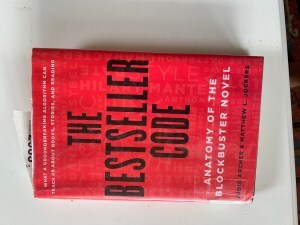 an approach/avoidance relationship with a book that describes using an algorithm to analyze why certain books have become bestsellers. I would like to write a bestseller, and yet while I am sure the advice is sound, using a method that doesn’t smack of creativity and imagination puts me off, so I am only reading small bits at a time.
an approach/avoidance relationship with a book that describes using an algorithm to analyze why certain books have become bestsellers. I would like to write a bestseller, and yet while I am sure the advice is sound, using a method that doesn’t smack of creativity and imagination puts me off, so I am only reading small bits at a time.
I would rather be taught by reading great writers. Another book that sits on the bookshelf in my office, that I pick up and read bits of from time to time, is Wallace Stegner’s Where the Bluebird Sings to the Lemonade Springs: Living and Writing in the West. Stegner shows, by example, how a writer can create magic by the quick juxtaposition of words and images. I have always read to be enchanted.
Here’s an example:
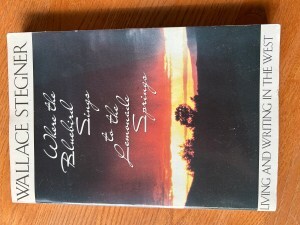 My first five years were constant motion, and what I retain of them is no more than flits and flashes, images on a broken film flapping through the projector: rare sun on the roof of our tent in the deep woods where now stands Redmond, Washington; the musty, buttery odor of the bread crusts distributed from a dishpan at mid-morning in the Seattle orphanage where my desperate mother stashed my brother and me for a while; the foreign smells and sounds of my grandfather’s Norwegian-speaking house in Lake Mills when we retreated there in the winter of 1913; the bare benches and varnished wainscots of the railroad station in Weyburn, on the Canadian border, with stern men in red coats staring down from the walls.
My first five years were constant motion, and what I retain of them is no more than flits and flashes, images on a broken film flapping through the projector: rare sun on the roof of our tent in the deep woods where now stands Redmond, Washington; the musty, buttery odor of the bread crusts distributed from a dishpan at mid-morning in the Seattle orphanage where my desperate mother stashed my brother and me for a while; the foreign smells and sounds of my grandfather’s Norwegian-speaking house in Lake Mills when we retreated there in the winter of 1913; the bare benches and varnished wainscots of the railroad station in Weyburn, on the Canadian border, with stern men in red coats staring down from the walls.
Alliteration. Judicious choice of details. Distressing personal details. As with Tim O’Brien’s The Things They Carried,which gives us a sense of the different soldiers through what they carried, a biography of sorts is assembled through the bits a child remembers.
My perusal of surfaces and bookshelves has made me pick up Alice Hoffman’s Turtle Moon, a favorite book I regularly reread, so this week, when I’ve finished my daily thousand words, that’s what I’ll be doing.
It opens like this:
The last major crime in the town of Verity was in 1958, when one of the Platts shot his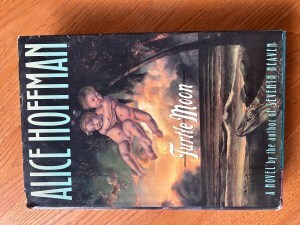 brother in an argument over a Chevy Nomad they had bought together over time. Usually, it’s so quiet you can hear the strangler figs dropping their fruit on the hoods of parked cars, leaving behind pulp and tiny black seeds. Since Verity is the most humid spot in eastern Florida, local people know enough to drink their coffee iced in the morning. The air all around the town limits is so thick that sometimes a soul cannot rise and instead attaches itself to a stranger, landing right between the shoulder blades with a thud that carries no more weight than a hummingbird.
brother in an argument over a Chevy Nomad they had bought together over time. Usually, it’s so quiet you can hear the strangler figs dropping their fruit on the hoods of parked cars, leaving behind pulp and tiny black seeds. Since Verity is the most humid spot in eastern Florida, local people know enough to drink their coffee iced in the morning. The air all around the town limits is so thick that sometimes a soul cannot rise and instead attaches itself to a stranger, landing right between the shoulder blades with a thud that carries no more weight than a hummingbird.
Don’t you have to know what comes next?
July 31, 2024
Five Reasons to Think Before You Post
Kaitlyn Dunnett/Kathy Lynn Emerson here, today grousing about the increasing number of typo-ridden and confusing Facebook posts I’ve seen lately. Am I the only one who proofreads everything before I send it out into the world?

I won’t get into why everyone should carefully proofread other written material, from legal papers to letters, emails, and blogs. Obviously, those should be as accurate as possible, if only to avoid confusion, especially if the author is a professional writer, but a shocking number of people don’t seem to care if they leave careless mistakes in less-than-formal postings. What follows is my list, in no particular order, of reasons to reconsider that choice.
*Accidentally leaving out a key word, like not, will say the exact opposite of what you intended. Yes, keyboards on phones and iPads are small, making accurate typing difficult, and typos do creep in, no matter how careful you try to be, but an extra read-through after you “publish” is worth the effort. Typos and autocorrect errors can be fixed at any time. The three dots to the right of each comment allow you to edit or delete and the three dots on the top right of a post offer those choices and more.

*Typo or not, a wrong word can make you sound stupid and undercut whatever point you were trying to make. Sometimes it even provokes a laugh. A friend of mine posted a meme showing Kamala Harris as a WW II factory worker. Another friend of hers (I checked—she’s not a troll although she is a MAGA Republican) commented with a long list of all the reasons no one should vote for Kamala, starting with the “fact” that she is “anti-semantic.” I assume she meant anti-Semitic (since anti-semantic would, I presume, mean against language), a charge that’s hard enough to take seriously when Kamala’s husband is Jewish, but the misspelling sure didn’t help her argument.
*Mistyping numbers and dates is my own biggest weakness, but there is also a common numerical mistake that isn’t a typo: the nineteenth century is the 1800s, not the 1900s. There are enough problems with teaching history to young people without being confusing on that issue.

*Turing now to the “confusing” aspect of Facebook posts, when you share someone else’s post or meme and comment on it, without making it clear if your snide remark is aimed at the post or at the original poster, you create confusion and quite possibly upset friends who misinterpret the identity of your target. I’m pretty sure everyone in the world gets this one now, but when it first appeared, J. D. Vance’s quote about “childless cat ladies” being responsible for all the ills in this country wasn’t as widely repeated as it has been since. Sharing it with at least a partial explanation would have been helpful. I added one to my re-post.

*A great many posters assume whoever reads their post will understand the reference or joke or recognize the people in the accompanying photo. That’s fine if you truly don’t care whether everyone who follows you “gets it” or not, but if you want the maximum number of people to take your point, it helps to add a few words of your own to clarify what’s going on. A case in point is a recent photo purporting to show how a woman looks before and after leaving common sense behind in favor of embracing MAGA ideals. When I first saw this, I got the overall idea, but I had no idea who the woman was. It adds context, and emphasizes the point, to know that she’s Kimberly Guilfoyle. In the first photo she’s with her first of two husbands, current Democratic governor of California, Gavin Newsom. The second photo is (probably) from the Republican convention, and definitely after she became engaged to marry Donald Trump, Jr.
Any examples to add? I’d love to hear about them.

Kathy Lynn Emerson/Kaitlyn Dunnett has had sixty-four books traditionally published and has self published others. She won the Agatha Award and was an Anthony and Macavity finalist for best mystery nonfiction of 2008 for How to Write Killer Historical Mysteries and was an Agatha Award finalist in 2015 in the best mystery short story category. In 2023 she won the Lea Wait Award for “excellence and achievement” from the Maine Writers and Publishers Alliance. She was the Malice Domestic Guest of Honor in 2014. She is currently working on creating new omnibus e-book editions of her backlist titles. Her website is www.KathyLynnEmerson.com.
Have You Seen The Trolls?
Charlene D’Avanzo:
If you haven’t seen the giant trolls at the Coastal Maine Botanical Garden do take the time to see these wonders of nature.
Thomas Dambo, famous for his troll sculptures, is said to be the world’s leading recycled-materials artist, His huge troll projects are designed to inspire us to see the natural world through a whimsically different lens and bring us deeply into our woodlands at the same time.
My husband John and I visited the trolls for the first time a few weeks ago. It was truly a extraordinary experience! The huge size alone of these creatures is absolutely stunning.
Roskva, the heaviest and strongest of the trolls grows taller and wider each year. If a troll forgets anything they can always ask her.
Lilja, still a child, loves the colors and the scents of the flowers.

Wise and mysterious Birk listens to the whispers of the soil. He knows everything that happens in the wild, and every day he tells tales to all the other creatures of the forest.

Ever curious Soren dreams about drifting around on a cloud in the sky.

Gro is a wanderer who disappears each fall and reappears in the spring.

July 29, 2024
What We’re Reading
Every once in a while the writers at MCW like to share what we’ve been reading. Here’s a sampling of books other writers have written that are currently providing us with distraction from our own work.
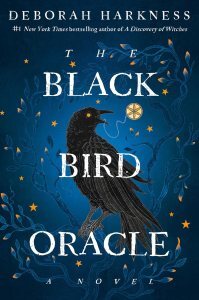 from Kaitlyn Dunnett/Kathy Lynn Emerson: I’m currently partway through three novels that all, purely by coincidence, feature witches as characters, in two cases as the protagonists. The first is Deborah Harkness’s The Black Bird Oracle, the fifth entry in her All Souls series. She goes back to focusing on Diana Bishop, the lead character in the first three titles, a witch married to a vampire. Harkness is a writer I admire a lot, not least because she’s also the author of a scholarly work on an aspect of the Elizabethan period. And there’s my segue into the second novel I’m reading, or rather rereading, The Elegant Witch (alternate title: Mist Over Pendle) by Robert Neill. It was first published in 1951, but since it has an historical setting, that doesn’t much matter. It’s his take on the Pendle Witch Trials during the reign of James the First, seen through the eyes of a young woman rebelling against her Puritan upbringing. It holds up well 70+ years later. The third book is slower going but I couldn’t resist the premise. It’s Wickedly Dangerous by Deborah Blake, the first in a series that turns the old Russian legends about a witch named Baba Yaga on their ear. I loved reading the Highlights for Children Baba Yaga stories when I was a kid. This is a very different incarnation. Baba is now calling herself Barbara Yager and lives in a camper with a secret door into another world. It’s the present day, and it looks like she’s destined for romance and crime solving with a sheriff who finds her presence in the area very suspicious. I don’t know yet if I’ll continue with the series, but I definitely want to keep reading to find out what happens next in this one.
from Kaitlyn Dunnett/Kathy Lynn Emerson: I’m currently partway through three novels that all, purely by coincidence, feature witches as characters, in two cases as the protagonists. The first is Deborah Harkness’s The Black Bird Oracle, the fifth entry in her All Souls series. She goes back to focusing on Diana Bishop, the lead character in the first three titles, a witch married to a vampire. Harkness is a writer I admire a lot, not least because she’s also the author of a scholarly work on an aspect of the Elizabethan period. And there’s my segue into the second novel I’m reading, or rather rereading, The Elegant Witch (alternate title: Mist Over Pendle) by Robert Neill. It was first published in 1951, but since it has an historical setting, that doesn’t much matter. It’s his take on the Pendle Witch Trials during the reign of James the First, seen through the eyes of a young woman rebelling against her Puritan upbringing. It holds up well 70+ years later. The third book is slower going but I couldn’t resist the premise. It’s Wickedly Dangerous by Deborah Blake, the first in a series that turns the old Russian legends about a witch named Baba Yaga on their ear. I loved reading the Highlights for Children Baba Yaga stories when I was a kid. This is a very different incarnation. Baba is now calling herself Barbara Yager and lives in a camper with a secret door into another world. It’s the present day, and it looks like she’s destined for romance and crime solving with a sheriff who finds her presence in the area very suspicious. I don’t know yet if I’ll continue with the series, but I definitely want to keep reading to find out what happens next in this one.
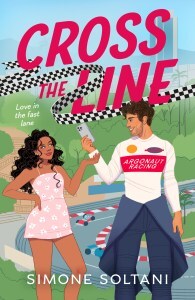
John Clark: I’m reading half a dozen different books right now. Just finished The Smell of Smoke and Ash by Patty Blount as an ARC reviewer. It comes out in November and is a dandy YA mystery with supernatural aspects. In addition, I’m enjoying The Eyes Are The Best Part by Monika Kim (creepy as hell), House of Ash and Bone by Joel Sutherland (another paranormal YA), Arcadia’s Curse by Jesi Lea Ryan (second in a three part series about a teen psychic), The Bloodborn Dragon by J.C. Rycroft (Sexy fantasy about a traveling spellsword who accidentally revives a miniature dragon who bonds with her and forces her on a mission with multiple baddies on their tail), and Cross The Line by Simone Soltani (a Formula One racer hires his best friend’s younger sister as his PR manager, but neither can keep their hands off the other…Steamy sports themed stories are one of my guilty pleasures)

Rob Kelley: My go-to reads are almost always thrillers and suspense, admiring the author’s craft, while also enjoying a lovely escape! I just finished 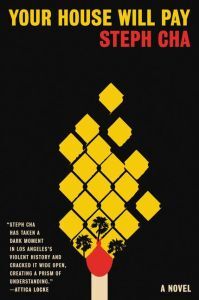 Your House Will Pay by Steph Cha, an amazing tale set during the unrest in LA in both the early 1990s and the present day, exploring the implications of race, violence, and redemption for two families struggling with their personal histories over the last decades and in the present moment.
Your House Will Pay by Steph Cha, an amazing tale set during the unrest in LA in both the early 1990s and the present day, exploring the implications of race, violence, and redemption for two families struggling with their personal histories over the last decades and in the present moment.
At the same time I was re-reading the closing scene of Tom Clancy’s Patriot Games for a good coastal chase scene example for my current work in progress: the first book in a thriller/amateur detective series set in Midcoast Maine.
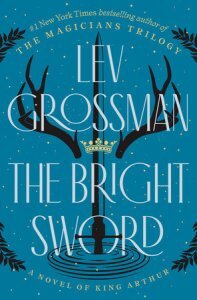 But my new read, one I’ve been waiting for all year, is The Bright Sword: A Novel of King Arthur by Lev Grossman. Many folks will know Grossman as the author of the Magicians Trilogy (The Magicians, The Magician King, The Magician’s Land) which I think of as a darker, funnier Hogwarts made up of way-too-smart graduate students having sex, drinking, and making world-ending decisions.
But my new read, one I’ve been waiting for all year, is The Bright Sword: A Novel of King Arthur by Lev Grossman. Many folks will know Grossman as the author of the Magicians Trilogy (The Magicians, The Magician King, The Magician’s Land) which I think of as a darker, funnier Hogwarts made up of way-too-smart graduate students having sex, drinking, and making world-ending decisions.
The Bright Sword begins with a young knight questing to Camelot to join the Round Table, only to find that Arthur has recently died in battle and only a motley few straggler knights remain. The book has all of the fabulous detail that sets Grossman’s writing apart, building a world that we both fear for and want to inhabit. At 683 pages, this one’s going to be distracting me for a little while!
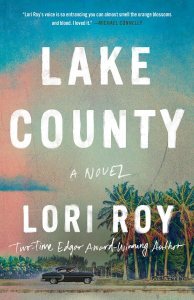 Kait Carson Just finished Lake County by Lori Roy. Goodreads styles the book as a Southern Gothic Thriller. Of course I had to try it. Started slow, but don’t let that deter you. When the book took off, it grabbed me by the throat and didn’t let go. Read the last three quarters in one sitting.
Kait Carson Just finished Lake County by Lori Roy. Goodreads styles the book as a Southern Gothic Thriller. Of course I had to try it. Started slow, but don’t let that deter you. When the book took off, it grabbed me by the throat and didn’t let go. Read the last three quarters in one sitting.
The story is set in a 1950s fictional Lake County, Florida town and features a star-struck teenager, a re-imagined Marilyn Monroe (know as Aunt Jean for the duration of this novel), a bolita game running boyfriend, an accidental murder, and the Tampa mob. The book is far from light fluff. It’s an in-depth study of how life can turn horribly wrong in a heartbeat and how no one is free from the consequences of past actions. Their own, or others.
The world Lori Roy imagines is the natural successor to Dennis Lehane’s Joe Coughlin stories. The book is a standalone, but I’ll be looking for more from this author.
Kate Flora: I haven’t been doing enough reading because I’m trying to finish a book. But one author I’ve really enjoyed recent is the Irish author Claire Keegan. Her fiction and short stories are little gems, so perfectly written, that often leave you to finish the stories for yourself. The collection of short stories, Walk the Blue Fields, is stunning. Foster, which was made into the great film The Silent Girl, is a short and moving and perfect. So is Small Things Like These. Right now I’m about to dig into a book that Matt Cost suggested, Matt Bell’s editing book, Refuse to Be Done. True confession, though. Since summer usually involves a lot of company, I spend some of my reading time reading cookbooks. In that vein, I often turn to Bon Appetite’s Weekend Entertaining.
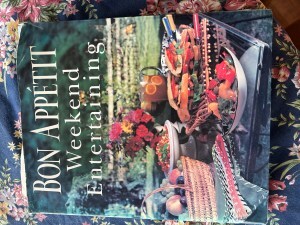



Hitting the three-quarter century mark
Kate Flora: Summer can be a time of leisure, and with that leisure comes remembering.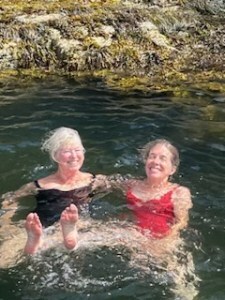 Lately I’ve been surprised to find myself saying, “Fifty years ago, I did this.” Or “Sixty years ago was the summer that I worked in the blueberry processing plant, having graduated from being in the fields raking.” Or, when it was on the news recently, thinking about where I was in 1969 when we landed on the moon—I was watching it on my tv in a crummy apartment in Columbus, Georgia. This summer I’m feeling the heartbreak of selling two lakefront lots, part of the family farm where I used to ramble in the summers more than seventy years ago.
Lately I’ve been surprised to find myself saying, “Fifty years ago, I did this.” Or “Sixty years ago was the summer that I worked in the blueberry processing plant, having graduated from being in the fields raking.” Or, when it was on the news recently, thinking about where I was in 1969 when we landed on the moon—I was watching it on my tv in a crummy apartment in Columbus, Georgia. This summer I’m feeling the heartbreak of selling two lakefront lots, part of the family farm where I used to ramble in the summers more than seventy years ago.
Last week’s author trip out to Vinalhaven reminded me of the summer I spend working on Islesboro for some eccentric New York millionaires. People who left their clothes and bath towels on the floor. Had untrained dogs that left something else on the floor. We were given the strangest outfits to wear for the workday and for serving at dinner parties. We carried irons to smooth the sheets when we turned down the beds, aligned the window shades exactly in the center, and always had Brasso and rags to polish all the brass that constantly corroded in the damp sea air. I had my first Manhattan there, from a couple I met at a dance. It was the summer was a candidate for Maine Blueberry Queen.
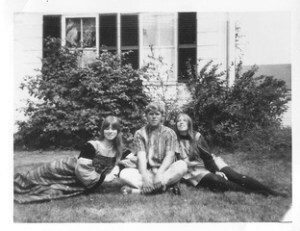
Me in the dress I wore to serve dinner guests on Islesboro. Here with John & Sara
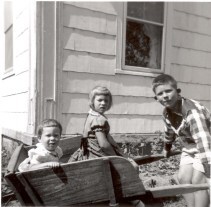 I often think about how different my rural Maine childhood was from those of most of the people I know. Summer was all about agriculture, from planting and weeding to picking and processing all the food we grew to put it away for the winter. Always, in my mother’s words, “the long, cold winter.” Summers were for working. First, raking blueberries. Then one summer at a writer’s camp in Pemaquid, assisting in the kitchen, where I make bread for all the guests. Then in the blueberry plant. August was the Union Fair, where working in the Methodist Church luncheon booth was part of the fun. Where my mother’s brochure of blueberry recipes was handed out during the blueberry festival.
I often think about how different my rural Maine childhood was from those of most of the people I know. Summer was all about agriculture, from planting and weeding to picking and processing all the food we grew to put it away for the winter. Always, in my mother’s words, “the long, cold winter.” Summers were for working. First, raking blueberries. Then one summer at a writer’s camp in Pemaquid, assisting in the kitchen, where I make bread for all the guests. Then in the blueberry plant. August was the Union Fair, where working in the Methodist Church luncheon booth was part of the fun. Where my mother’s brochure of blueberry recipes was handed out during the blueberry festival.
Those long ago Maine summers brought visitors from New York and New Jersey, coming 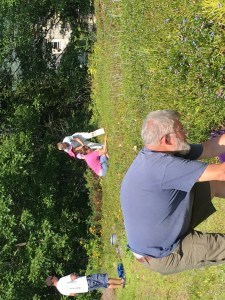 for a week of eating fresh food and rambling through the fields and swimming in the pond. There would always be lobster day, when my father would ask us how many lobsters we wanted and then drive down to the coast to pick them up. We would put extra leaves in the big table in our unfinished shed, where we ate in the summer, and cover it with newspapers. There would be big bowls on the table for the shells. While John and I and Sara held lobster races on the kitchen floor, dad would ask us how many ears of corn we wanted, and go down to pick it. Soon two huge pots would be steaming on the six burner stove—the graniteware canner for the lobsters and a big Revere ware pot for the corn. Melted butter and cabbage salad completed the meal. There would usually be pie, even though lobster dinners should have been enough. Blueberry pie, of course.
for a week of eating fresh food and rambling through the fields and swimming in the pond. There would always be lobster day, when my father would ask us how many lobsters we wanted and then drive down to the coast to pick them up. We would put extra leaves in the big table in our unfinished shed, where we ate in the summer, and cover it with newspapers. There would be big bowls on the table for the shells. While John and I and Sara held lobster races on the kitchen floor, dad would ask us how many ears of corn we wanted, and go down to pick it. Soon two huge pots would be steaming on the six burner stove—the graniteware canner for the lobsters and a big Revere ware pot for the corn. Melted butter and cabbage salad completed the meal. There would usually be pie, even though lobster dinners should have been enough. Blueberry pie, of course.
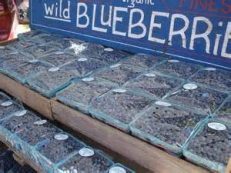
Summer would be my first flip flops, a second hand gift from those out of state visitors. Afternoon swims in the pond with whoever was hot and needed a place to swim and sometimes the illicit pleasure of skinny dipping after dark. Working as a chambermaid at Whitehall Inn in Camden. Dances at the Rockland Rec Center and pizza at King’s.
This is my birthday weekend. I’ve decided a week-long celebration is required for a big number birthday. Lots of good friends. Funny presents. Swimming in the sea and cocktails on the deck. Fish and chips at Cook’s Lobster House, then after dinner drinks with neighbors to watch the sunset. And although there was a birthday cake, I also made a blueberry-peach pie, with Maine wild blueberries, which we had for breakfast. Because after all, who wouldn’t really rather have pie for breakfast than most things?
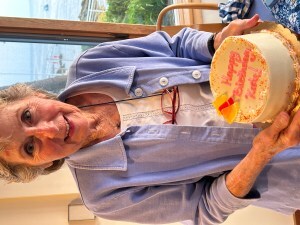
July 26, 2024
Weekend Update: July 27-28, 2024
 Next week at Maine Crime Writers there will be posts by Kate Flora (Monday), the MCW group on “What We’re Reading” (Tuesday), Kaitlyn Dunnett/Kathy Lynn Emerson (Thursday) and Kate Flora (Friday).
Next week at Maine Crime Writers there will be posts by Kate Flora (Monday), the MCW group on “What We’re Reading” (Tuesday), Kaitlyn Dunnett/Kathy Lynn Emerson (Thursday) and Kate Flora (Friday).
In the news department, here’s what’s happening with some of us who blog regularly at Maine Crime Writers:
Kate Flora, Jule Selbo, and Maureen Milliken had a great time visiting the Vinalhaven Library last week. Ferry ride, fabulous accommodations, a cocktail party, and a standing room only audience for a making a mystery program.
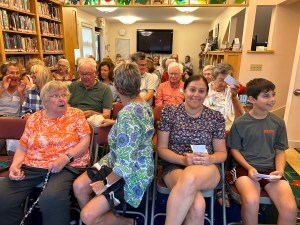

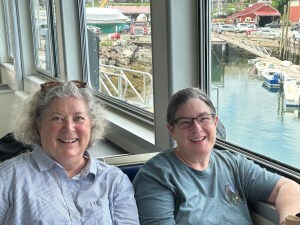
Matt Cost will be having a book launch for City Gone Askew on pub day, July 31st, at the Brunswick Golf Club in Brunswick. On August 1st he will be doing a COST TALK at the Louis T. Graves Memorial Library in Kennebunk at 5:30 p.m. August COST TALKS are below.
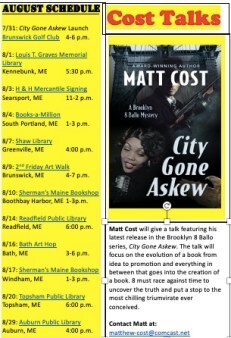
An invitation to readers of this blog: Do you have news relating to Maine, Crime, or Writing? We’d love to hear from you. Just comment below to share.
And a reminder: If your library, school, or organization is looking for a speaker, we are often available to talk about the writing process, research, where we get our ideas, and other mysteries of the business, along with the very popular “Making a Mystery” with audience participation, and “Casting Call: How We Staff Our Mysteries.” We also do programs on Zoom. Contact Kate Flora
Lea Wait's Blog
- Lea Wait's profile
- 509 followers



